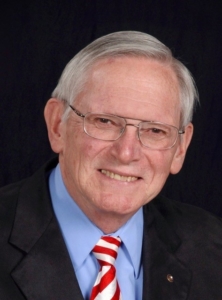Women’s Status
Then and Now
Capital City Today
By: S.L. Frisbie, IV for Polk News-Sun

S.L. Frisbie IV Florida Newspaper Hall of Fame Member, 4th-Generation Polk County Newspaper Publisher
Women’s status, then and now
My generation of husbands, I believe, will be the last to declare: “No wife of mine will ever have to work!”
For starters, men have finally come to understand that keeping house, preparing three meals a day, and most important, raising children, is work.
Unlike the “work” in my opening declaration, (1) it doesn’t pay anything, (2) it’s not an 8-to-5 job, five days a week, and (3) it doesn’t have benefits like vacations, holidays, health insurance, or time-and-a-half after 40 hours.
(And I would add, parenthetically, that the phrase “No wife of mine” raises the issue of just how many wives this benevolent husband figured he was speaking for. Okay, it was a figure of speech, nothing more.)
The reality of today’s economy is that many — perhaps most — households require two salaries to maintain a lifestyle to which most families aspire. A college education, for example, used to cost a few hundred, or at most a few thousand dollars a year.
Today, a year at many colleges approaches the cost of a new car. Every year.
The change is not just in the cost of living; for many of us, it takes two salaries to keep a kid (or perhaps two) in college, two cars in the garage, and daycare for the younger kids.
Single-parent households are increasingly common, and face even greater economic challenges. I stand in great respect.
Mary (my wife of 57 years, if I have counted correctly) with whom I was discussing this issue last week, told me that when we were married in 1963, women who carried credit cards were required by the issuer to have their husband’s names on the account.
In my two years in the active Army, beginning in 1962, my unit had only one female member, a clerk-typist (a member of the Women’s Army Corps, or WACs).
When I joined the Florida National Guard in 1964, the Guard didn’t have any women.
The first woman assigned to the 53rd Infantry Brigade some years later, by which time I was either a captain or a major, was assigned as my stenographer. She didn’t have much time for the job, since she spent most of the time flirting with a much more senior officer.
Within a year or so, about half of the 10 or 11 officers assigned to me were women, as were many of the 75 or so enlisted members, earning my 85-member section the nickname of “Frisbie’s Harem.” Among the female officers was one of the three finest officers with whom I served in my 30-year Guard career. We still stay in touch.
The year I joined the Guard also marked my return to civilian life, as managing editor of The Polk County Democrat. Women reporters on the staff covered social activities and some government beats, while men covered sports and the “tough news” on the police beat.
It was an effort to spare women the grimmer environs of police coverage. And for probably the same reason, there were few if any female police officers at that time. I report this not as justification, but as a statement of fact.
Within a few years, that distinction faded away, and my three successors as managing editor were all women. Each began working under my close supervision, and each subtly took on more and more decision-making authority as growth of the company to four newspapers required that I spend more time in other areas.
In other professions, women quickly rose through the ranks in once male-dominated fields like medicine and law, while men began pursuing careers in traditionally female vocations like nursing and classroom teaching.
The concept of “men’s jobs” and “women’s jobs” faded away.
Women are now found among the ranks of college and university presidents and other CEO positions so frequently that it no longer merits comment.
On Nov. 28, a young woman kicked a 35-yard kick-off for Vanderbilt, en route to their eighth consecutive loss. On Oct. 27, an all-female officiating team officiated a televised college football game.
The incoming vice-president of the United States is a woman, and I would lay odds that she will become America’s first female president, maybe in four years, perhaps eight.
———
(S. L. Frisbie is retired. His two daughters and one son all have chosen careers other than journalism, in keeping with his wish that they pursue their own dreams. Should any of them — male or female — run for president, they will get his vote.)

 SL Discusses Christmas Trees . . . then and now
SL Discusses Christmas Trees . . . then and now